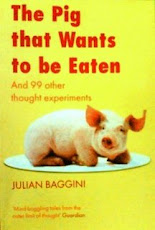Wow, this is another one of those crazy ones.
It is very very difficult for us to think that thinking is a by-product of some other cranial process. What process will result in thought? Perhaps if we thought like a baby - the stomach is hungry, body wants food, baby cries - epiphenomenalism sort of works. All actions, little thought, thought of little consequence. Am I oversimplifying things?
I suppose this 'idea works for reflex actions. But how can the body do things without the basis of forethought?
Lets' say I want to make dinner. Does my body know it wants potato soup before I think about it? Does my tongue already dictate my actions based on what it wants to taste? Maybe. I go get a few potatoes. I choose a knife to peel the potatoes. Did my body tell me not to use the vegetable peeler? It doesn't seem likely. Maybe my eyes see the knife and create the thought of picking it up, as strange as that may sound. But there are still flaws. Wouldn't I think of getting a cutting instrument before my eyes went searching for one? Hmmm.
What about meditative or religious thought? Yes, there may be stimuli e.g. post-crisis trauma or routine e.g. regular visits to a place of worship that may trigger such thinking. But can the content of such thoughts be the result of some other bodily function? What bodily function would trigger thoughts of God? (I am sure some readers are going to the gutter with the last line ) What about the psychological or physiological effects of these thoughts? Are these effects a by-product or the intended outcome?
If our thoughts are the product of some other process, what determines the quality of the thoughts and ideas? The efficacy or efficiency of the unknown process? In all fairness and non-bias, humans have varying degrees of smarts (or in our case, perceived smarts) Do people who say dumb or irrational things have dumb or irrational processes? It doesn't quite work though some will say that chemicals in our bodies can in some way dictate our thoughts and subsequently actions.
I can’t buy the ephiphen argument. Sorry.
Sunday, March 4, 2007
Subscribe to:
Post Comments (Atom)
.jpg)
2 comments:
Epipen argument?
No need to argue. Understand.
Whoever owns this blog, I would like to say that he has a great idea of choosing a topic.
Post a Comment